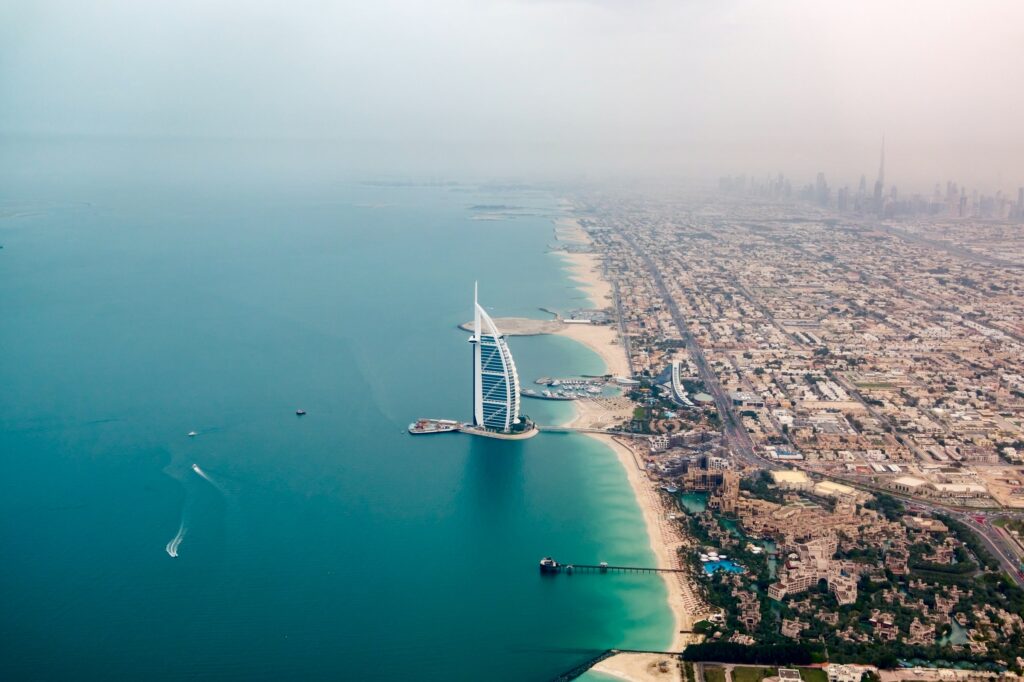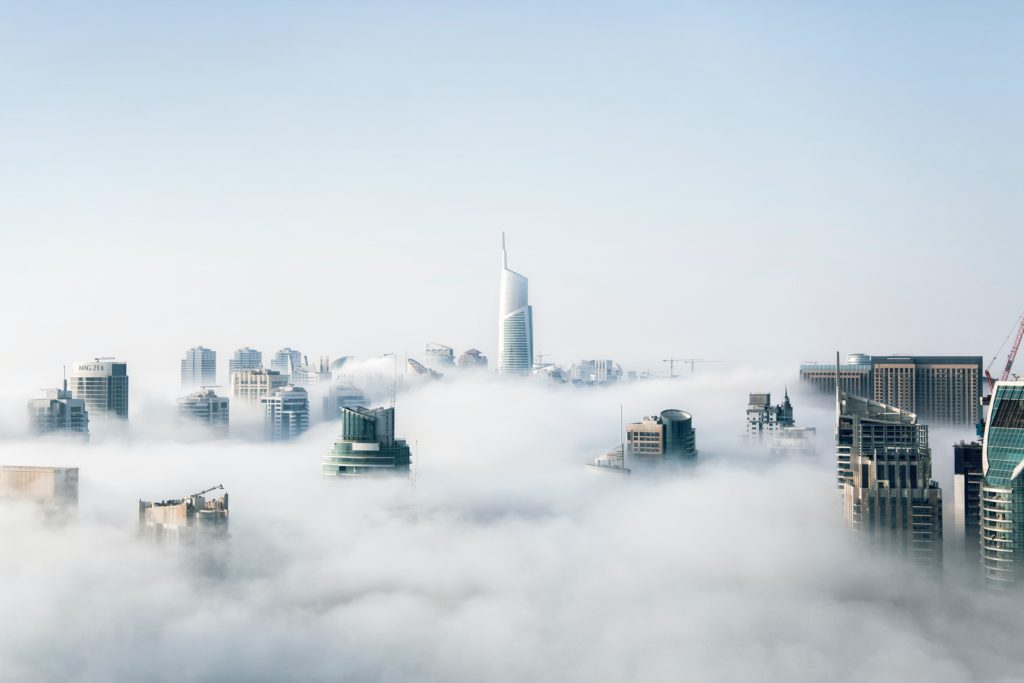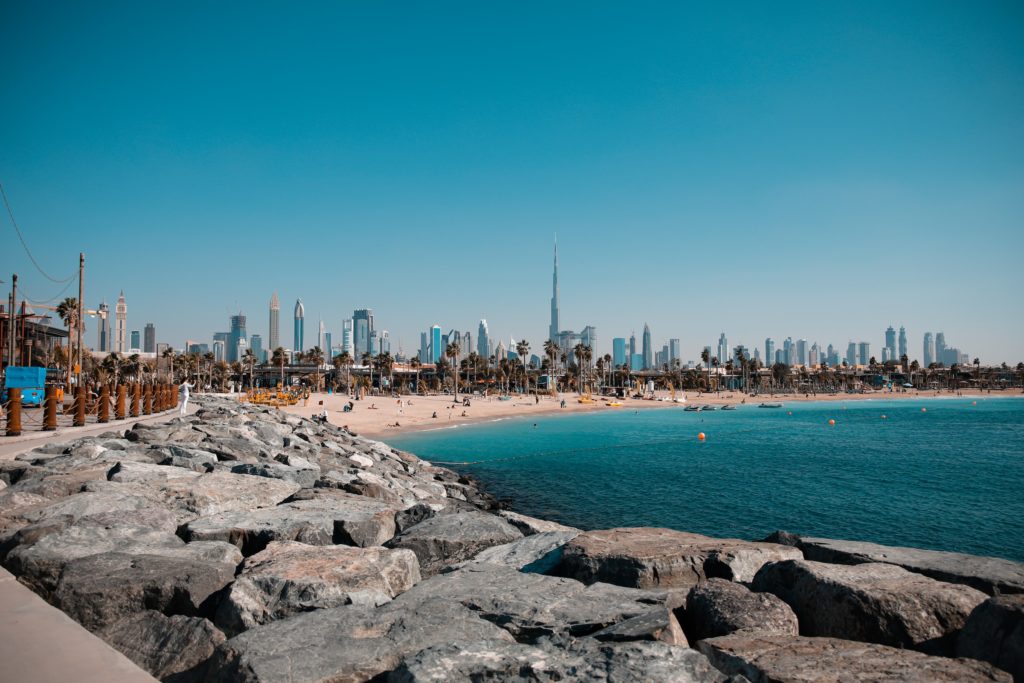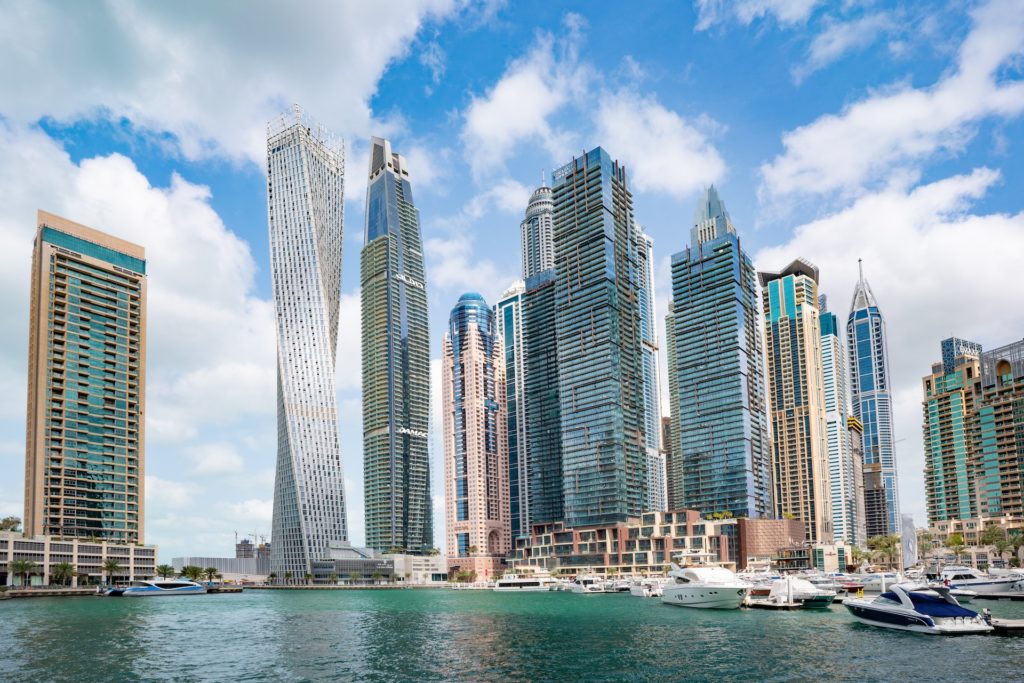Health Insurance in Dubai
Moving to Dubai
Dubai is the most populated city in the UAE and the capital of the Emirate of Dubai. The city has grown rapidly from a small fishing village to a sprawling lavish city and global business hub.
Dubai is one of the most popular expat destinations in the world. It is estimated that, at present, the population of Dubai stands at 3.5 million people, with 3.2 million of those being non-Emirati. That means that over 90% of the population in Dubai are expats.
Dubai promises its residents a sunny and hot climate, with good job prospects and tax-free wages. It’s known for its extravagant and luxurious lifestyle and has the high wages to match. If you’re thinking of moving to Dubai, our guide has everything you need to know about living in Dubai as an expat.
Living in Dubai as an Expat
Dubai has a lot to offer expats. The city has over 3,500 hours of sunshine per year and with gorgeous golden beaches and the warm Persian Gulf sea on hand, there’s plenty of opportunity to enjoy the warm weather.
Emiratis are friendly people who show tolerance and an open-minded approach to visitors in their country, provided that their culture and values are respected. This welcoming attitude has resulted in a melting pot of nationalities and cultures that can be seen in every aspect of Dubai life. There is a rich variety of shopping and eating out, with international cuisine. Expats will have the chance to try new things or stick to their home comforts if they prefer.
Most expats enjoy a high quality of life and live in safety, as Dubai has a low crime rate. They also experience a great social life – Dubai is known for its entertainment and expats will often enjoy their non-working hours in a private beach club or 5-star rooftop bar.
Arabic is the official language in Dubai, but English is widely spoken, especially in business. This can be a huge help to expats who come from the UK or another English-speaking country, as most signs, menus, and important documents will be available in English.
Living in Dubai as an Expat

Dubai Visa Requirements
If you want to live and work in Dubai, you will need a residence visa. If you don’t have a job before you move, you can look for work while staying in Dubai on a tourist visa. You will need to secure the relevant work visa before you start working. Your employer will have to send your documents, including your passport, contract, and other documents such as educational and professional certificates, to the UAE Immigration Service.
The residence visa will be valid for two years if you work in the private sector or three years if you work in the public sector. You can renew the visa after the period has ended, and you can keep renewing indefinitely. You will only be able to open a bank account in Dubai after you have a residence visa.
To apply for a residence or work visa, you will need to undertake a medical check and submit a health certificate, along with your other documents. The check will need to be taken at a Dubai medical clinic. It will involve a chest x-ray and blood tests. If the blood test sees a positive result for a communicable disease such as HIV/AIDS, hepatitis, or tuberculosis, the applicant will need to leave Dubai immediately.
The Job Market in Dubai
Dubai’s economy may have boomed thanks to oil and gas, but like many middle-eastern countries, Dubai and the rest of the UAE are looking to diversify. Nowadays, the main industries are tourism, financial services, and real estate. The economy also benefits from work in trade, aviation, and technology.
There are many types of roles on offer for expats, from manual work such as bartending, construction, and cooking, to office-based jobs such as consultants, administrators, and sales managers.
Dubai has no income tax, meaning wages are tax-free. The city is also known to offer generous employment packages, especially for highly skilled and experienced workers. This can include accommodation allowances, regular flights home, and allowances for children’s education.
There is high competition for jobs in Dubai, especially in Finance, IT, HR, and Administration roles. Skilled workers may find it easier to find a role, particularly in teaching, healthcare, and engineering.
The Job Market in Dubai

Cost of Living in Dubai
The cost of living in Dubai is generally seen as high. This is certainly true in some areas, such as property. Rent can be expensive, although not always as expensive as in other major cities, such as London. School fees are also very high, in part due to the competition for places by expat children.
Expats can find that transport costs are low, especially driving a car, as petrol is so cheap in Dubai. Taxi fares are also low, as are public transport tickets. The price of groceries and day-to-day necessities are generally seen as reasonable.
For a more in-depth look at the cost of living in Dubai, read our blog.
Healthcare and Health Insurance in Dubai
As expat numbers in Dubai have begun to swell, so the cost implications of medical care have also begun to spiral. This is especially so in a country known for its extreme summer heat, which may be felt in the form of heatstroke, dehydration, and sunburn.
Over the years, expat healthcare in Dubai has therefore changed considerably. These days it is critical that expats and travellers alike fully understand international health insurance in Dubai if they are to receive the care they need.
Get a QuoteHealthcare and Health Insurance in Dubai

Healthcare in Dubai
Dubai offers internationally renowned hospitals which provide state-of-the-art facilities, but at a cost. Many of the better-known hospitals are impressive buildings in their own right, more closely resembling spotlessly clean hotels than medical establishments.
Of course, all this luxury comes at a cost, and it is for this reason that many expats choose health insurance for expats. Anyone expecting to pay out of pocket or “risk it” and assume all will be fine with their health could be in for a large fee to cover treatment.
In general, life expectancies in Dubai are comparable with the United Kingdom and other Western nations, which reflects the high standards of care to be expected here. The only caveat to be aware of is that some more specialist treatment may require care in another country.
Health Insurance in Dubai
While hospitals in Dubai provide either free or significantly subsidized care to locals, expats are unlikely to benefit from these services. Instead, you will need to rely on private or public health insurance.
Public Health Insurance in Dubai
Expats living and working in Dubai can access public healthcare, but they must first pay for a health card. Some services may carry an additional fee. Dubai nationals are able to access public healthcare for free, or sometimes at a vastly reduced cost.
Legislation in the last decade stipulates that companies must provide healthcare insurance for their employees, both expats and nationals. The insurance provided grants discounted healthcare at public facilities, though be aware that the levels of care covered by many employer-provided policies is meagre at best. Many will omit services that many consider essential – such as dental care or cover for family members. With that in mind, dental cover for expats may be worth considering as could be international health insurance for families.
If you are lucky enough to be offered such a policy, therefore, be certain to check the fine print so that you understand fully what is and is not covered by your policy. Also, you may need to keep a healthy balance in your bank account in order to cover dental work if and when required; remember that the UAE is a “no debt” country so relying on credit cards is generally not the best option.
Furthermore, it is important to keep your health insurance card with you at all times to prove coverage, lest treatment should be needed at short notice.
Private Health Insurance in Dubai
As an alternative to public health insurance, many expats opt for private medical insurance.
Such policies normally offer greater levels of cover and a range of services not covered by the state-run system.
That said, be aware that individuals with private health insurance in Dubai will often be turned away from public facilities. As a result, those who opt for such a policy should take note of their local private hospital, so they know who to contact in the case of an emergency.
Short-term visitors to Dubai should not rely on paying out-of-pocket for medical care, which can be very expensive. Instead, travellers should also investigate options for private health insurance in order to ensure affordable and timely standards of care.
Increasingly some form of international health insurance – whether that’s through an employer or purchased privately – is a pre-requisite before you are granted a visa to enter the country so be sure to do your research in plenty of time before your arrival.
Prescriptions in Dubai
Visitors and expats alike should be aware that prescriptions in Dubai may be rather different to what they are used to. Firstly, some of the drugs they are familiar with may be difficult to encounter in Dubai, while some may be banned altogether.
For example, as in many other Gulf States, sleeping pills and anti-depressants are generally banned in all but the most extreme cases and a letter from your own doctor may be required before you are prescribed any.
On the other hand, there are plenty of pharmacies in Dubai and many of them are open 24 hours a day, so if you have a prescription, you should have no problems accessing your medication. Like other parts of the UAE healthcare system, however, prescription medications can be expensive in Dubai so plan ahead.
Visitors are allowed to bring up to three months’ worth of prescription drugs with them, while residents can bring up to a year’s supply with them. Note that the original prescription and/or a letter from your doctor may be required to prove their authenticity and that they are purely intended for personal consumption. Read more about medications you can bring into Dubai in our blog.
Money in Dubai
The local currency is the Arab Emirates Dirham, abbreviated to AED. The exchange rate is around 4.5 AED to 1 GDP, or 3.6 AED to 1 USD.
Dubai is well known for low taxes. The city doesn’t charge tax on property, income, or capital gains and it also doesn’t charge VAT. Combined with high wages often offered to expats, it means that residents can really see a difference in their take-home pay packet.
Education in Dubai
Dubai has both a public and a private educational system. Education is compulsory for all children in Dubai aged five to 15.
Free public education is open to all residents, including expats. The curriculum will typically be taught in Arabic, with English as a second language. Public schools in Dubai are segregated by gender.
There are many fantastic international schools across Dubai, which many expats choose to educate their children. These schools will teach national curriculums from abroad, such as English, US, and Indian. Some also teach the UAE curriculum. They will teach in English or the language of the school’s organisational body. All international schools in the UAE have a requirement to teach a local syllabus, usually Arabic, Islamic studies, or UAE social studies.
Most schools in Dubai run from September to June or July. Pakistani, Indian, and Japanese International Schools run from April to March.
Education in Dubai

Weather in Dubai
If you like the sun, the climate is great for much of the year. As a desert city, the summers are long, starting in April and finishing around October. At the height of summer, temperatures can hit the mid to late 40s and there is very little rainfall. The winter months have a more temperate climate, with temperatures reaching around 22 °C during the day and 12 °C at night.
The extreme heat isn’t for everyone, and many people will plan holidays abroad during the hottest months of the year. However, Dubai is well-equipped to deal with the hot weather, with the vast majority of buildings having air con. As well as high temperatures,, Dubai can also experience sandstorms in the summer, thunderstorms in the winter, and high levels of humidity, which can make for an unpleasant environment.
Local Law and Customs in Dubai
Dubai is a Muslim city and local laws and customs will differ from what expats may be used to in the UK. There can be serious penalties for infringements on the local laws, including fines and even jail time.
To find out more about how to avoid jail in Dubai, you can read our blog.
Alcohol and drugs
There is zero tolerance for drugs and alcohol. Possession of even the smallest amount of illegal drugs can lead to a minimum four-year jail sentence. You should take care of the import of prescription drugs and some over-the-counter drugs.
Residents can obtain liquor licences to consume alcohol in private homes. These licences permit the holder to purchase or consume alcohol only in the Emirate that issued the licence; a permit issued in Abu Dhabi, for example, is not valid in Dubai. Alcoholic drinks are served in licensed hotels and clubs, but it is a punishable offence to drink, or to be drunk, in public.
You can read more in our guide to alcohol in Dubai.
Fraud
Fraud, including bouncing cheques and the non-payment of bills (including hotel bills), is regarded seriously in the UAE and can often result in imprisonment and/or a fine. Bail is generally not available to non-residents of the UAE who are arrested for crimes involving fraud or financial crime. Convicted debtors will not generally be released from jail until the debt is paid or waived.
Other illegal activities
Other seemingly innocent activities in Dubai that can result in punishment include swearing (in public and online), taking photos of government buildings, and criticizing the UAE government online.
Homosexuality is illegal in Dubai, as is extra-marital sex, when either of the person’s spouse makes a complaint to the authorities. Public displays of affection should be avoided for any couple.
There are some laws that only apply to women, including around what women can and can’t wear. Typically, in public areas, women should cover their shoulders and legs and underwear shouldn’t be visible. Swimming costumes and bikinis can only be worn around swimming pools or on the beach.
Moving to Dubai Checklist
If you are moving to Dubai, you will need:
- Valid passport
- Money for flights and initial costs
- To work out your monthly budget to cover accommodation, groceries, utilities
- Medical check (it can be beneficial to check you do not have any of the communicable diseases that will prevent you moving to Dubai before you relocate)
- Flights to Dubai
- Employment contract, with offer and no-objection letter (if you will be working)
- International medical insurance policy
- Residency/Working visa application
- Enrolment in school for your children
- Proof of accommodation (such as a tenancy agreement or property purchase)
- Local SIM card or mobile phone
- To learn some basic Arabic phrases
- Arrange furniture for the new home
- Arrange Wi-Fi for the new home
- Tie up loose ends at home, such as closing utility accounts and informing the tax office